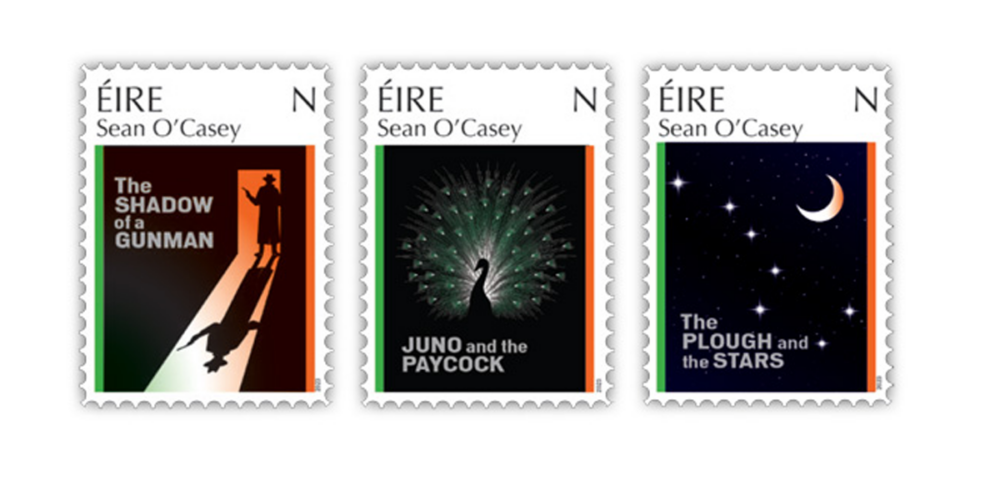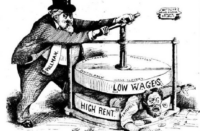Seán O’Casey—the first proletarian dramatist writing in English—made his theme the struggle for the emancipation of the Irish people and, by extension, of all working people.
In Ireland, O’Casey is (unfairly) best known for his first three plays, examining the Irish working class at crucial moments of history. The Shadow of a Gunman (1923) is set in the midst of the War of Independence, Juno and the Paycock (1924) at the time of the Civil War, and The Plough and the Stars (1926) in the months leading up to and during the Easter Rising. This autumn the acclaimed Druid Theatre Company are putting on all three plays in Ireland and the United States, both singly as well as, in an abbreviated form, as a one-day theatre marathon.
In the decade 1913–1923 Ireland was a centre of revolution. In 1922 the Irish people had been dealt the Irish Free State, resulting in a civil war. Seán O’Casey’s Dublin trilogy was written during the Civil War (The Shadow of a Gunman) and in the very early years of this Free State.
Connolly’s Irish allies were obvious on the first step in this venture, Irish independence: the “advanced nationalists” of the conspiratorial Irish Republican Brotherhood. O’Casey, whose formative experience had been the historic Dublin lockout of 1913, dismissed this strategy of a broad anti-imperialist alliance. Blinkered by his anti-national prejudice against Connolly’s non-proletarian nationalist allies, he failed to see the momentous significance of Connolly’s strategy of a democratic revolution.
This attitude is reflected in his Dublin trilogy. O’Casey presents us with an isolated, leaderless working class that was unable to rise to the challenge of the times. His disparaging assessment of the Easter Rising allows him to ignore the 1916 Proclamation and its vision of an independent Ireland, a society working in the interests of the common people.
In Connolly’s analysis, national and social liberation were each the condition for the other. O’Casey disagreed and therefore only saw a part, not the whole.
The Dublin Trilogy
In all three plays we meet working-class and lumpenproletarian Dubliners who live in tenements in the most deprived of circumstances. Their class-consciousness is not highly developed. The absence of leadership, organisation and an all-embracing working-class philosophy is evident as they reach various levels of understanding but little will to act against their dire circumstances.
While in each of the plays upheavals outside the slums have an impact on their lives, the movement at the heart of the struggles outside seems to have little connection with them and their needs, and acts independently of them.
In The Shadow of a Gunman the Gunman passes through this community unrecognised and indirectly causes the death of Minnie Powell. In Juno and the Paycock this movement claims the lives of two young men, one of whom had already withdrawn. In The Plough and the Stars the movement is portrayed as a disembodied voice calling for blood sacrifice. No truly positive representatives of this movement appear on stage. Jack Clitheroe (The Plough and the Stars) is a member of the Citizen Army but is not depicted as a person who will move the class forward.
One of the most class-conscious characters in the trilogy, Fluther Good, is not a member of the organised movement and represents a pragmatic and grounded perspective. While he supports the nationalist movement, he is critical of the leaders and of what O’Casey sees as the romanticised ideals of the Rising.
The slum-dwellers are presented as people who thrive on illusions and myths about the heroic past. We find this in Minnie Powell (The Shadow of a Gunman), and Boyle (Juno and the Paycock), and those who wish to escape the greater world around them, such as Nora Clitheroe (The Plough and the Stars).
On the other hand, it is among this very community that all the ingredients necessary for a conscious working-class movement are found: despite their weaknesses, they are resourceful, creative and realist and can produce potential leaders, such as Seumas Shields and Donal Davoren (The Shadow of a Gunman), Juno (Juno and the Paycock), and Fluther Good (The Plough and the Stars), people who under the right circumstances could combine all that is necessary, appreciate the needs of the people, and act in their interests.
So, despite these illusions and weaknesses, the proletarian O’Casey presents the Irish working class as ultimately able to revolutionise reality. Any production of the trilogy must accentuate this potential.
O’Casey’s portrayal of the Dublin working class in his trilogy sparked controversy and criticism for depicting them as ignorant and disconnected with the national movement of the time. It caused outrage for being dismissive of the leaders of the Rising. These plays are nevertheless worth seeing today. By examining the lives of the working class, O’Casey sheds light on the struggles and needs of ordinary people during this revolutionary period in Irish history.
Depicting the harsh realities in the Dublin slums, he invites a critical examination of Irish society at a time of revolution and war, and raises important questions about the impact of deprivation and ignorance on a revolutionary situation. The characters and their vivid, creative and powerful language express their potential for creating a better world for working people.
Issues of social inequality, political disillusionment and the struggle for social justice continue to resonate with audiences all round the world. The plays are a significant contribution to modern Irish drama and prepare the ground for O’Casey’s magnificent body of work to come.
■ The O’Casey trilogy is being staged by the Druid Theatre Company in the Abbey Theatre, Dublin, 26 August to 16 September.






